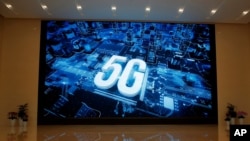At a gathering of current and former U.S. officials and private-sector executives in Washington on Friday, there was widespread concern that the U.S. is lagging behind China in the development of several key technologies, and that it faces an uncertain future that other countries may challenge it in. It has historically dominated the development of cutting-edge communications and computing technologies.
The gathering was convened by the Special Competition Research Project, spearheaded by former Google CEO Eric Schmidt, whose stated purpose is “to ensure that the United States is capable and organized to win the techno-economic competition between now and 2030. , which is the key window for shaping the future.”
Among attendees, the prevailing view was that the country’s ability to actually win the game was at stake.
dire predictions
A few days before the summit, the SCSP released a report predicting what would happen if China became a global technology leader.
“Understanding the stakes requires imagining a world where an authoritarian state controls digital infrastructure, dominates the world’s technology platforms, controls the means of production for key technologies, and leverages a new wave of general technologies, such as biotechnology and new energy technologies, to change its society, economy and military,” the report said.
The report envisions a future in which China, rather than the United States, will reap the trillions of dollars in revenue generated by technological advancements and use its clout to prove that dictatorship, not democracy, is the superior form of government.
In the report’s grim vision, China promotes the concept of a “sovereign” internet, where individual countries restrict the flow of information to their people, and China develops and potentially controls key technologies that support critical infrastructure in countries around the world.
Finally, the report warns that in such a scenario, the U.S. military would lose its technological lead over China and other competitors, while China could cut off the supply of “microelectronics and other critical technological inputs.”
“Nothing is inevitable”
Speaking at the summit, White House National Security Adviser Jack Sullivan appeared to agree that the United States faces significant challenges in developing new technologies in sync with China.
“We know that nothing is inevitable to maintain America’s core strength and competitive advantage in the world,” Sullivan said. “And we know it has to be renewed, reinvigorated and managed, especially when it comes to America’s technological leadership.”
In China, he said, “we are facing a competitor determined to surpass U.S. technological leadership and willing to devote almost unlimited resources to it.”
However, Sullivan also said that the administration of President Joe Biden is aware of the threat and has been working hard to deal with it.In particular, Sullivan pointed to the recent passage of the CHIPS Act, which allocated more than $50 billion to establish advanced microchip manufacturing facilities in the United States
“We are making unprecedented investments to get us back on track to lead the industry of the future,” Sullivan said. “We’re doubling down on our efforts to attract the world’s top tech talent. We’ve adjusted our tech protection tools to new geopolitical realities. Most importantly, we’ve done it in an inclusive, robust way. Multiply and work with us values remain the same.”
not fast enough’
HR McMaster, a retired Army general who served as national security adviser during the Trump administration, attended the meeting as a panelist. While progress is being made, the pace needs to be accelerated, he said.
“It’s not going fast enough because we’re so far behind because of years of complacency based on false assumptions about the nature of the post-Cold War world,” McMaster said.
Calling for a more aggressive blocking of China’s technological progress, he said: “We need export controls now to prevent China from gaining a differentiation advantage, [while] Maintain our competitive advantage. “
China has repeatedly criticized U.S. efforts to hamper its technological progress, an issue Chinese Foreign Ministry spokesman Mao Ning addressed this week when asked about U.S. export controls.
“What the US is doing is purely ‘tech hegemony,'” she said. “It seeks to use its technological prowess as an advantage, hindering and suppressing the development of emerging markets and developing countries. The United States, while advocating fair competition and a so-called ‘rules-based order’, only cares about ‘America First’. ‘And believes that strength is Correct. The U.S. probably wants China and other developing countries to be at the lower end of the chain forever. That’s not constructive.”
5G as a warning
A recurring theme at the event was the development of 5G wireless internet technology, an area in which Western countries, including the United States, lag far behind China. Thanks to preferential treatment from Beijing, Chinese companies, especially Huawei, dominate the world in supplying equipment for 5G networks.
Concerned that using Chinese-made equipment as the backbone of sensitive communications technology could create espionage or security risks, the United States and some of its allies have launched a global campaign to block the installation of Huawei equipment, even if it means rolling out 5G wireless services.
“The key message here is that we need to make sure that what happened to us in 5G doesn’t happen again,” Schmidt said. “I couldn’t say more clearly. You don’t want to work on the platform technology that you use every day that is dominated by non-democratic, non-open systems.”
Schmidt said it would be difficult to stay ahead of China in technology, and predicted Beijing would “double down on areas we care about,” including artificial intelligence, quantum computing, biotechnology and more.
maintain the relationship
Jon Huntsman, the former U.S. ambassador to China, said that Americans generally do not know how far China is ahead of the United States in certain technologies. Huntsman, now vice chairman of Ford Motor Co., said China is at least five years ahead of the U.S. in electric vehicles.
He said the United States must take a good course to catch up with China in some areas and maintain its advantage in others. He particularly emphasized the need to maintain human-to-human business and other relationships with the Chinese.
“Decoupling our people is not a good thing,” he said. “If we do, we will end our relationship with China in the same place as Russia.” He added: “Decoupling will only create separation, misunderstanding and instability on a global scale in terms of security.”


